 editing, elizabethana, teatro
editing, elizabethana, teatro  2 Comments
2 Comments Piccolo Bollettino Diurno
Scommettiamo che oggi non riesco a revisionare un bottone?
*huge sigh…*
 editing, elizabethana, teatro
editing, elizabethana, teatro  2 Comments
2 Comments Scommettiamo che oggi non riesco a revisionare un bottone?
*huge sigh…*
 editing, elizabethana, teatro
editing, elizabethana, teatro  Commenti disabilitati su Piccolo Bollettino Notturno
Commenti disabilitati su Piccolo Bollettino Notturno Oggi ho combinato pochino.
Non è che non abbia combinato proprio nulla, ma non ho potato la scena di ieri e non ho concluso la scena di oggi.
Oh well, immagino che non possa andare dritta tutti i giorni.
Riuscirò domani?
Non ho una gran fiducia, ma vi farò sapere.
 editing, elizabethana, scribblemania, teatro
editing, elizabethana, scribblemania, teatro  Commenti disabilitati su Piccolo Bollettino Notturno
Commenti disabilitati su Piccolo Bollettino Notturno Un po’ più presto del solito.
Upstart Crow, la scena di oggi, l’avevo in buona parte sistemata come assignment per il corso di Karl Iglesias – il che è un bene, perché la giornata è stata, come previsto, impossibile*.
Qualche ora di lavoro post coenam mi ha condotta a un punto soddisfacente. È ancora troppo lunga, ma alas mi ci ritrovo affezionata.
Robert Greene è divertente da scrivere…
Prima di sfrondare vorrei sentirla letta, perché sulla carta sembra tutta necessaria. Ma in tutta probabilità sono io che non vedo le lungaggini per miopia da giornata e da malguidato affetto. Mi piace pensare che sarei capace di sentirle, le lungaggini…
Oh well – per stasera basta così, grazie. Domani non promette molto meglio, ma ho anche una specie di turno di guardia, potentially graveyard watch, in cui potrei riuscire a lavorare un po’ sull’ultima scena del I Atto.
O magari vedere se, col vantaggio di qualche ora di sonno, riesco a potare Robert Greene.
____________________________________________________
* E mi piacerebbe vantarmi di avere eroicamente resistito alla tentazione di cominciare a leggere Foe, recapitato in tarda mattinata – ma ad essere sinceri è mancato il tempo materiale di cedere alle tentazioni, per cui…
 elizabethana, guardando la storia, musica
elizabethana, guardando la storia, musica  3 Comments
3 Comments 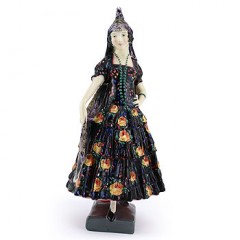 Si direbbe che The Spanish Lady abbia incuriosito.
Si direbbe che The Spanish Lady abbia incuriosito.
I. mi chiede (via email!) se sono sicura delle parole, perché una volta a Dublino ne ha sentito una versione diversa…
E io rispondo che, dal XVII Secolo in qua, di varianti ce ne sono diverse, e tendono a ricadere in due categorie – corteggiamento e corteggiamento-con-duello, come in questa versione:
As I went out by Dublin City at the hour of 12 at night
Who should I see but a Spanish lady washing her feet by candlelight
First she washed them then she dried them all by the fire of amber coal
In all my life I ne’er did see a maid so sweet about the sole
I asked her would she come out walking and went on till the grey cocks crew
A coach I stopped then to instate her and we rode on till the sky was blue
Combes of amber in her hair were and her eyes knew every spell
In all my life I ne’re did see a woman I could love so well
But when I came to where I found her and set her down from the halted coach
Who was there with his arms folded but the fearful swordsman Tiger Roche
Blades were out ‘twas thrust and cut, never a man gave me more fright
Till I lay him dead on the floor where she stood holding the candlelight
So if you go to Dublin City at the hour of twelve at night
Beware of the girls who sit in their windows combing their hair in the candlelight
I met one and we went walking, I thought that she would be my wife
When I came to where I found her, if it wasn’t for my sword I’d have lost my life.
E a dire la verità, mi piace da matti il corteggiatore/spadaccino che ammette di avere avuto lo spavento della sua vita – e di esserne uscito più cauto in fatto di graziose fanciulle alla finestra…
 Incidentalmente, il dublinese David “Tiger” Roche era uno di quegli avventurieri e duellatori dalla variegata carriera che solo nel Settecento. Figlio di un gentiluomo, ufficiale a sedici anni, fascinoso e violento, eroe delle Indian Wars, degradato con ignominia per furto, ripetutamente processato per omicidio, parlamentare mancato, cronicamente indebitato, cacciatore di dote… Alla fin fine pare che fosse innocente della maggior parte delle malefatte di cui era accusato, ma va’ a sapere, e comunque aveva questa tendenza a vendicarsi con prontezza ed efficacia, hence the nickname of “Tiger”. Non è improbabile che fosse l’ispirazione per il Barry Lyndon di Thackeray, e comunque si capisce il nervosismo del narratore…
Incidentalmente, il dublinese David “Tiger” Roche era uno di quegli avventurieri e duellatori dalla variegata carriera che solo nel Settecento. Figlio di un gentiluomo, ufficiale a sedici anni, fascinoso e violento, eroe delle Indian Wars, degradato con ignominia per furto, ripetutamente processato per omicidio, parlamentare mancato, cronicamente indebitato, cacciatore di dote… Alla fin fine pare che fosse innocente della maggior parte delle malefatte di cui era accusato, ma va’ a sapere, e comunque aveva questa tendenza a vendicarsi con prontezza ed efficacia, hence the nickname of “Tiger”. Non è improbabile che fosse l’ispirazione per il Barry Lyndon di Thackeray, e comunque si capisce il nervosismo del narratore…
Alla versione che ho riportato nell’altro post, invece, manca questa strofa qui – quella maudlin:
I’ve wandered north and I’ve wandered south
By Stoneybatter and Patrick’s Close
Up and around by the Gloucester Diamond
And back by Napper Tandy’s house.
Old age has laid her hand on me
Cold as a fire of ashy coals
But where o where is the Spanish Lady,
Neat and sweet about the soul?
Stoneybatter è un quartiere di Dublino, e Napper Tandy un rivoluzionario irlandese del Settecento, paladino del libero commercio e personaggio turbolento.
Ed è chiaro che in entrambi i casi stiamo parlando di versioni settecentesche o più tardi. Chissà chi era in origine lo spadaccino feroce – e di chi la casa…
Poi S. mi chiede (sempre via email…) se è la stessa canzone che cantano in Moby Dick e nelle aventure di Sharpe. Ebbene, no: almeno per quanto riguarda Melville, si tratta invece di una canzone navale del tardo Settecento:
Farewell and adieu to you, Spanish Ladies,
Farewell and adieu to you, ladies of Spain;
For we’ve received orders for to sail for old England*,
And we may never see you fair ladies again.
Chorus:
We will rant and we’ll roar like true British sailors,
We’ll rant and we’ll roar all on the salt seas.
Until we strike soundings in the channel of old England;
From Ushant to Scilly is thirty-five** leagues.
We hove our ship to with the wind from sou’west, boys
We hove our ship to, deep soundings to take;
‘Twas forty-five fathoms, with a white sandy bottom,
So we squared our main yard and up channel did make.
chorus
The first land we sighted was call-ed the Dodman,
Next Rame Head off Plymouth, Start, Portland and Wight;
We sailed by Beachy, by Fairlight and Dover,
And then we bore up for the South Foreland light.
chorus
Then the signal was made for the grand fleet to anchor,
And all in the Downs that night for to lie;
Let go your shank painter, let go your cat stopper***
Haul up your clewgarnets, let tacks and sheets fly!****
chorus
Now let ev’ry man drink off his full bumper,
And let ev’ry man drink off his full glass;
We’ll drink and be jolly and drown melancholy,
And here’s to the health of each true-hearted lass.
Sinceramente in Sharpe non me la ricordo – però non ho letto tutti i romanzi della serie. O forse magari è nel film? Perché sembra non esserci cine(tele)avventura navale d’ambientazione inglese in cui gli sceneggiatori non piazzino Spanish Ladies – e mi vengono in mente Master & Commander e Hornblower, per dire…
E già che ci siamo, lasciate che aggiunga un’altra signora spagnuola – la protagonista di questa ballata elisabettiana:
Will you hear a Spanish lady,
How shee wooed an English man?
Garments gay and rich as may be
Decked with jewels she had on.
Of a comely countenance and grace was she,
And by birth and parentage of high degree.
As his prisoner there he kept her,
In his hands her life did lye!
Cupid’s bands did tye them faster
By the liking of an eye.
In his courteous company was all her joy,
To favour him in any thing she was not coy.
But at last there came commandment
For to set the ladies free,
With their jewels still adorned,
None to do them injury.
Then said this lady mild, “Full woe is me;
O let me still sustain this kind captivity!
“Gallant captain, shew some pity
To a ladye in distresse;
Leave me not within this city,
For to dye in heavinesse:
Thou hast this present day my body free,
But my heart in prison still remains with thee.”
“How should’st thou, fair lady, love me,
Whom thou knowest thy country’s foe?
Thy fair wordes make me suspect thee:
Serpents lie where flowers grow.”
“All the harme I wishe to thee, most courteous knight,
God grant the same upon my head may fully light!
“Blessed be the time and season,
That you came on Spanish ground;
If our foes you may be termed,
Gentle foes we have you found:
With our city, you have won our hearts eche one,
Then to your country bear away, that is your owne.”
“Rest you still, most gallant lady;
Rest you still, and weep no more;
Of fair lovers there is plenty,
Spain doth yield a wonderous store.”
“Spaniards fraught with jealousy we often find,
But Englishmen through all the world are counted kind.”
“Leave me not unto a Spaniard,
You alone enjoy my heart:
I am lovely, young, and tender,
Love is likewise my desert:
Still to serve thee day and night my mind is prest;
The wife of every Englishman is counted blest.”
“It wold be a shame, fair lady,
For to bear a woman hence;
English soldiers never carry
Any such without offence.”
“I’ll quickly change myself, if it be so,
And like a page Ile follow thee, where’er thou go.”
“I have neither gold nor silver
To maintain thee in this case,
And to travel is great charges,
As you know in every place.”
“My chains and jewels every one shal be thy own,
And eke five hundred pounds in gold that lies unknown.”
“On the seas are many dangers,
Many storms do there arise,
Which wil be to ladies dreadful,
And force tears from watery eyes.”
“Well in troth I shall endure extremity,
For I could find in heart to lose my life for thee.”
“Courteous ladye, leave this fancy,
Here comes all that breeds the strife;
I in England have already
A sweet woman to my wife:
I will not falsify my vow for gold nor gain,
Nor yet for all the fairest dames that live in Spain.”
“O how happy is that woman
That enjoys so true a friend!
Many happy days God send her;
Of my suit I make an end:
On my knees I pardon crave for my offence,
Which did from love and true affection first commence.
“Commend me to thy lovely lady,
Bear to her this chain of gold;
And these bracelets for a token;
Grieving that I was so bold:
All my jewels in like sort take thou with thee,
For they are fitting for thy wife, but not for me.
“I will spend my days in prayer,
Love and all her laws’ defye;
In a nunnery will I shroud mee
Far from any companye:
But ere my prayers have an end, be sure of this,
To pray for thee and for thy love I will not miss.
“Thus farewell, most gallant captain!
Farewell too my heart’s content
Count not Spanish ladies wanton,
Though to thee my love was bent:
Joy and true prosperity goe still with thee!”
“The like fall ever to thy share, most fair ladìe.”
Magari vi ricordate questo post, e il filmato in cui Vivien Leigh e Laurence Olivier (non?) la cantano in Fire Over England.
Tradizione vuole che la ballata fosse ispirata a una storia vera, quella di sir Richard Levison (o forse invece sir John Bolle) e della sua bella prigionera, catturata durante il raid di Cadice nel 1596.
Vero o no (e tutto sommato spero abbastanza di no: did Sir Richard tell the tale? How ungentlemanly of him, after all!) bisogna pensare che per un certo numero di secoli la Signora Spagnuola abbia incarnato in Inghilterra una certa idea di bellezza esotica e limitatamente passionale.
Un’idea abbastanza radicata da farci su ballate e canzoni, da conservare ballate e canzoni attraverso i secoli, variandone i versi per adattarle all’epoca. E abbastanza perché secoli più tardi, cercando qualcosa di significativo del tempo da far cantare ai propri personaggi, romanzieri e sceneggiatori tendano a ritrovare sempre le signore spagnuole.
Si direbbe che, come pensa Miss Minchin del titolo immaginario di Sara Crewe, parlare di signore spagnuole in Inghilterra sia romantico & pittoresco.
_____________________________________________
* O anche we sail under orders
** Oppure 34 o 45…
*** Vale a dire “gettate le ancore”
**** Ovvero “ammainate le vele”
 editing, elizabethana, teatro
editing, elizabethana, teatro  Commenti disabilitati su Piccolo Bollettino Notturno
Commenti disabilitati su Piccolo Bollettino Notturno Ho finito Once In The Service e, già che c’ero, anche la scena successiva – Always Missing Something.
Non ho mai strologato tanto sul ritmo di un dialogo in vita mia, ma non è facilissimo imprimere a delle battute in prosa un andamento giambico evitando che suoni forzato…
Il che, mi viene da pensare, sarà un divertimento supplementare quando si tratterà di tradurre tutto ciò. Pensieri notturni sparsi e prematuri.
E da domani a martedì prossimo si prospetta una settimana di fuoco, ma speriamo di riuscire a infilarci dentro anche un po’ di revisione e, se piace alle divinità preposte e io mi comporto come si deve, di finire il Primo Atto entro domenica.
 elizabethana, scribblemania, teatro
elizabethana, scribblemania, teatro  Commenti disabilitati su Piccolo Bollettino Notturno
Commenti disabilitati su Piccolo Bollettino Notturno Sistemato la scena di oggi (Different Stages) e, già che c’ero, anche un pezzetto della successiva (Once In The Service).
Scene corte, but still.
Adesso Will è del tutto a disagio, ha l’impressione che non riuscirà mai a sfondare, ha assistito a un alterco che non ha capito e forse comincia a detestare la persona che più ammira al mondo.
E siamo a metà del Primo Atto.
E ho finito il corso con Karl Iglesias (UCLA): interessante, utile – e il teacher ha detto cose lusinghiere dei miei esercizi.
Sono ragionevolmente soddisfatta di me stessa, stasera…
 elizabethana, grillopensante, teatro
elizabethana, grillopensante, teatro  3 Comments
3 Comments 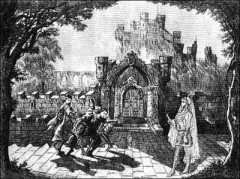 Questo è il problema. Se sia meglio portare il fantasma in scena come uno spirito incarnato o suggerire la sua incorporeità per mezzo di luci blu, velari e macchina della nebbia – o magari non mostrarlo affatto. Spettro, apparizione, voce disincarnata, ossessione folle – e con un’idea registica dire che si è messo fine al dibattito sulla natura dell’ectoplasma vendicativo…
Questo è il problema. Se sia meglio portare il fantasma in scena come uno spirito incarnato o suggerire la sua incorporeità per mezzo di luci blu, velari e macchina della nebbia – o magari non mostrarlo affatto. Spettro, apparizione, voce disincarnata, ossessione folle – e con un’idea registica dire che si è messo fine al dibattito sulla natura dell’ectoplasma vendicativo…
Perché il fatto è, vedete, che quando Shakespeare scrisse il suo Amleto, i fantasmi nell’Inghilterra riformata erano una vexata quaestio. Per i cattolici, naturalmente, erano anime del purgatorio, tornate a chiedere preghiere, esigere vendetta o sistemare faccenduole lasciate indietro. Ma la riforma aveva fatto piazza pulita di purgatorio, limbo e altre consimili sistemazioni provvisorie: una volta morti si ascendeva o si sprofondava in luoghi da cui nessuno tornava più.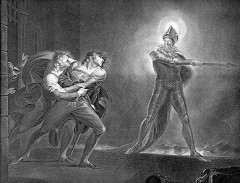
Però i fantasmi c’erano – pochi dubitavano dell’esistenza di apparizioni spettrali. Il problema era come spiegarle… La risposta protestante era, come spesso accadeva, il diavolo. Non di fantasmi si trattava, ma di forme create illusoriamente (o abitate – su questo non c’era accordo) dal demonio al fine di sconvolgere le menti più impressionabili*, spingerle a compiere azioni riprovevoli come la vendetta e/o il suicidio e, già che ci si era, rastrellarne le anime.
Ma questi erano gli strologamenti dei teologi e dei re**, e l’opinione generale era che le anime dei morti tornassero indietro eccome. Magari non erano affatto raccomandabili, magari avevano davvero a che fare con il diavolo, ma erano propio fantasmi.
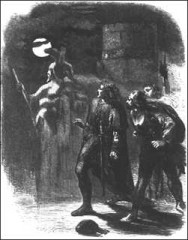 E la questione cessa di sembrare di lana caprina quando si guarda che cosa ne fa Shakespeare, portando in scena il fantasma di Amleto senior. Bernardo e Marcello, i primi a vederlo, non sanno bene che cosa pensarne ma, a ogni buon conto, chiamano e mandano avanti Orazio, perché Orazio sa il Latino e quindi è in grado di conversare con l’apparizione – e presumibilmente scacciarla, se necessario.
E la questione cessa di sembrare di lana caprina quando si guarda che cosa ne fa Shakespeare, portando in scena il fantasma di Amleto senior. Bernardo e Marcello, i primi a vederlo, non sanno bene che cosa pensarne ma, a ogni buon conto, chiamano e mandano avanti Orazio, perché Orazio sa il Latino e quindi è in grado di conversare con l’apparizione – e presumibilmente scacciarla, se necessario.
Orazio ha studiato a Wittemberg, e quindi arriva armato di accademico, filosofico e teologico disprezzo per tutto l’armamentario superstizioso medievale***. E infatti parte arringando lo spettro come se fosse un diavolo… E bisogna dire che allo spettro non piace molto essere perentoriamente invitato a parlare “per il cielo!”…
Questo potrebbe significare che si tratta in effetti di un diavolo cui non piace sentir nominare le cose superne, oppure che si tratta di un fantasma legittimo, offeso dal sospetto di Orazio. La faccenda rimane ambigua in una maniera che doveva essere accettabile per il Master of Revels e molto eccitante per un pubblico elisabettiano.
Diavolo? Fantasma? Fantasma? Diavolo?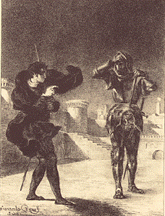
La cosa buffa è che il filosofico Orazio si converte subito all’idea del fantasma, mentre Amleto, com’è nel suo stile, dubita. Ci saranno anche più cose in cielo e in terra che in tutta la filosofia di Orazio, ma perbacco, questa preoccupante apparizione vuole spingere il nostro tetro giovanotto a commettere peccato… diavolo o fantasma? Fantasma o diavolo?
E poi tutti sappiamo come va a finire.
Ora, la complessiva ambiguità dell’ectoplasma danese incarnava senza scioglierlo uno dei grandi dubbi dell’epoca, e l’Inglese medio si riconosceva nel rovello di Amleto: è o non è un fantasma? Defunto in cerca di giustizia (of sorts) o diavolo tentatore? È più indegno trascurare la volontà del trapassato o rischiare l’influenza diabolica? Eccetera, eccetera.
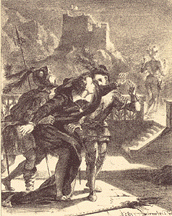 In termini di pratica teatrale, la faccenda si traduceva in un attore in armatura che entrava in scena (da destra o da sinistra?), faceva le sue declamazioni con voce stentorea**** e poi si affrettava a cambiarsi per interpretare un’altra particina o due.
In termini di pratica teatrale, la faccenda si traduceva in un attore in armatura che entrava in scena (da destra o da sinistra?), faceva le sue declamazioni con voce stentorea**** e poi si affrettava a cambiarsi per interpretare un’altra particina o due.
E così rimase per vari secoli, e ci vollle il Novecento perché qualcuno cominciasse a porsi la questione in termini più registici che teologici.
Intanto, qualunque cosa l’apparizione fosse, bisognava in qualche modo segnalarne il carattere preternaturale. La voce da stentorea cominciò a farsi eterea ed echeggiante, la presenza scenica si sciolse in diluvii di nebbia, garze, tulli, luci blu, nebbia artificiale, ombre, proiezioni e – al cinema – trasparenze e doppie esposizioni.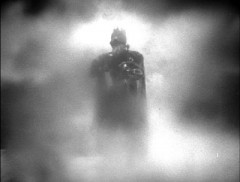
Per esempio, nella versione olivieriana del 1948, il fantasma è un’armatura dalla celata semichiusa, avvolta in vortici di nebbia. Ricordo di avere visto, a Cardiff negli Anni Novanta, una produzione studentesca in cui il fantasma se ne stava dietro un canovaccio nero. Al momento giusto, un piazzato bianco illuminava l’attore, per dare l’impressione di un’immagine sfocata che emergesse dal buio.
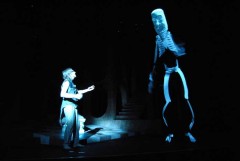 Ora, non è che questo ingentilimento e questa rarefazione dello spettro avessero eliminato del tutto l’opzione diavolo-cadavere-animato/posseduto, che ricompariva periodicamente nella forma di fantasmi-scheletri o fantasmi-zombi. E tuttavia, la tendenza ebbe uno sviluppo logico in altre direzioni: lo spettro scomparve del tutto quando i registi cominciarono a ipotizzare che non fosse un fantasma affatto – ma un caso di possessione, una proiezione dell’inconscio di Amleto o un sintomo della sua follia.
Ora, non è che questo ingentilimento e questa rarefazione dello spettro avessero eliminato del tutto l’opzione diavolo-cadavere-animato/posseduto, che ricompariva periodicamente nella forma di fantasmi-scheletri o fantasmi-zombi. E tuttavia, la tendenza ebbe uno sviluppo logico in altre direzioni: lo spettro scomparve del tutto quando i registi cominciarono a ipotizzare che non fosse un fantasma affatto – ma un caso di possessione, una proiezione dell’inconscio di Amleto o un sintomo della sua follia.
Per esempio, a New York nel 1964, John Gielgud diresse Richard Burton in una produzione quasi ghost-less: al momento fatale, un’ombra indistinta si proiettava sullo scenario, e Burton/Amleto faceva conversazione con la voce del regista in quinta – una soluzione di cui Gielgud era particolarmente orgoglioso. Ma la storica del teatro Eleanor Prosser era meno entusiasta:
Tutti i versi erano squisitamente salmodiati nel tono tremulo di un santo morente – tutti tranne quelli troppo spudoratamente rivoltanti oppure osceni. Quelli – la descrizione dell’avvelenamento e l’immagine della lussuria che si pasce di letame – erano cassati. Ma in queste produzioni moderne, abbiamo mai modo di essere davvero spaventati o scossi da quel che il Fantasma dice, e da come lo dice?*****
E poi, nel 1980, Vincent Price interpretò a Londra un Amleto interamente senza fantasma. Le battute del defunto babbo le diceva lui, con una voce diversa
[U]n grugnito tipo teatro Noh, che suonava come un tritarifiuti shakespeariano,
ricorda l’attore e regista shakespeariano Paul Whitworth, prima di esprimere tutta una serie di dubbi: c’è il fatto che scegliere proprio Vincent Price per una faccenda di (forse) possessione sembrava singolarmente poco sottile; c’è il non del tutto trascurabile particolare che anche Bernardo, Francesco, Marcello e Orazio vedono il fantasma senza che Amleto sia nei paraggi; c’è la conseguenza che così Amleto, anziché scivolare gradualmente nei guai di una causa che si presenta con qualche merito di giustizia, appare fin dall’inizio matto da legare e matto da legare rimane fino alla fine.
E non so quali e quanti Amleti abbiate visto in vita vostra, ma sono certa che le apparizioni del fantasma variavano attraverso tutta la gamma – a riprova del fatto che, se gli Elisabettiani non avevano le idee chiare in fatto di spettri, non le abbiamo del tutto nemmeno noi. Anima in pena, diavolo, follia, inconscio represso? L’ambiguità deliberata di Shakespeare in proposito lascia spazio alle interpretazioni – anche quelle che non avrebbero avuto un senso definito a cavallo tra Cinque e Seicento.
La cosa importante è che il Fantasma non è una pittoresca particina secondaria, né un comodo device letterario. Nato come espressione di un dilemma che la riforma protestante si trascinava dietro come le catene di Marley, rimane un fulcro concettuale di tutto il dramma: la risposta registica alla domanda “che cosa è il Fantasma?” la dice lunga su chi è Amleto – e su chi siamo noi che ne interpretiamo la storia.
È davvero calzante, non credete, che proprio questo fosse il ruolo in cui Shakespeare saliva in scena a incontrare il suo pubblico?
__________________________________________________________
* Tra l’altro, un temperamento malinconico (leggi depressivo, in modern parlance) esponeva particolarmente a questo genere di attacchi. Amleto, per dire.
** Per dire, Giacomo VI e I era un appassionato (e bilioso) demonologo, ossessionato da streghe, diavoli e apparizioni, su cui scrisse abbondantemente – e si capisce che l’opinione di un re tendeva a fare testo. Poi viene da chiedersi se, quando era ancora solo VI, detestasse il conte di Bothwell perché lo riteneva uno stregone, o se dicesse che era uno stregone perché lo detestava…
*** Disprezzo molto elisabettiano e riformato, si capisce.
**** Leggenda e il solito Aubrey vogliono che Shakespeare recitasse il ruolo del fantasma – dal che i biografi deducono che non dovesse essere un attore straordinariamente bravo, ma possedesse polmoni di tutto rispetto.
***** Eleanor Prosser, Hamlet and Revenge, 1971. (Traduzione mia)
 elizabethana, teatro
elizabethana, teatro  Commenti disabilitati su Elizabeth – The Last Dance
Commenti disabilitati su Elizabeth – The Last Dance Magari è solo una mia impressione, ma mi pare che da un po’ di tempo non parliamo di cose elisabettiane…
Riprenderemo, ma intanto guardate Elizabeth – The Last Dance, una di quelle straordinarie cose a mezza strada tra danza e teatro di Lindsay Kemp. Qui c’è il trailer:
E qui le riprese fatte durante il tour giapponese nel 2008:
E buona domenica.
____________________________________
And, on an entirely unrelated note, Happy Birthday, L.!
 elizabethana, musica, teatro
elizabethana, musica, teatro  1 Comment
1 Comment Sono affascinata da questo video di fotografie del Sogno, messo in scena dalla Lindsay Kemp Company al Sadler’s Wells Theatre di Londra nel 1985. Dev’essere stato magico.
E chissà se Lindsay Kemp, ballerino, attore, coreografo e mimo, sia un discendente del suo omonimo, l’attore elisabettiano Will Kemp, l’uomo che danzò in nove giorni da Londra a Norwich?
Buona domenica – e se siete in quel di Mantova, ricordatevi la Mostra della Piccola Editoria al Centro Baratta.
 elizabethana, memories
elizabethana, memories  Commenti disabilitati su A Shakespearean Rite Of Passage
Commenti disabilitati su A Shakespearean Rite Of Passage Summer night, warm and damp to the point of stickiness. The lights are doused, and the chattering dies down to a trail of whispers. For a handful of moments, I can hear the crickets in the trees all around the theatre. One of those handfuls of moments calculated to break just when the audience has forgotten to breath – but I’m just eleven, and unaware of this kind of calculations.
Suddenly come a shaft of purplish light, and the bang of a trapdoor opening – then the witches climb onstage in a whorl of black rags and cackles, and run to crouch around the cauldron…
“Way to start,” mutters A., from the next seat. And although she is thirteen and bewildered, she is right. Far more than she knows.
I am eleven, as I said, and this is my first Macbeth. My first Shakespeare. My first time at the Teatro Romano in Verona. My first less than traditional production. I know who Shakespeare is, but I never saw anything of his staged. As far as staged things go, my experience boils down to some children’s plays and a few nights at the opera – very traditional-minded productions. I’m not prepared for a tale of Medieval kings in Scotland changed – no, distilled to an affair of empty stage, shadows, cutting lights and nondescript, black costumes.
I’m not even sure I like it all that much. Why, truth be told, I think I’m rather disappointed. Everything is so grim, so dark, no tartan sashes, no cloaks, no swords, no crenellated towers, nothing of what I had expected… And then, little by little, with no bells and whistles to keep my attention, I start to concentrate on the words. Not just the plot, but the way the words make the plot different from its synopsis. Yes, yes, the witches, the prophecy, the regicide, the folly, the defeat, it’s all there. But the creeping fear and guilt, the hoot of the night birds, the ghost, the blood stains that won’t go away, the boughs from Birnam Wood closing in… it all takes life from the power of the words, in a way no painted scenery, no elaborate costume could ever convey. And not just life, but truth.
And mind you, when we file out of the theatre I’m still eleven, and I’m not entirely convinced of what I saw. I still much prefer crenellated towers and period costumes, and I secretly hope all theatre needn’t be like tonight. And yet, when Father asks did I like the Macbeth, and I say yes, it’s not a complete lie. I may not have liked it in the usal sense of the word, but I know I’ve gone through some rite of passage. A door has opened on something that I don’t fully understand yet, but looks meaningful. Something that has to do not only with tales, but the way tales are told. Something that I want to understand – and learn, if I can.
Now, more than twenty-five years later, I know that what Shakespeare taught me that night was the power of words. A similar production of a weaker play would have just bored me, but because Shakespeare’s words were so powerful, the young girl I was grasped the essence of the story – and something else too: a hazy notion that, while the production and the acting were modern interpretation, through the words the long dead Shakespeare was still speaking to me across the centuries.
It was very hazy back then, I grant you, but it was to grow, branch out, develop into several tenets of my faith in words, when it comes to history, literature, and writing. Not bad for one shakespearean night, was it?
____________________________________________________
This (bilingual) post is my contribution to the Shakespeare Birthplace Trust “Happy Birthday Shakespeare” project. For a week, starting today, bloggers all around the world will post all kinds of Shakespearean musings.